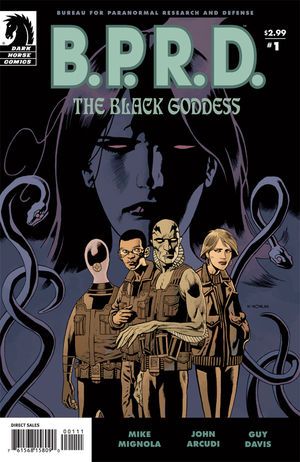John Arcudi has been working in the comic book industry since the mid-1980s. Most recently he has bolstered his fanbase as one of the writers (along with Hellboy creator Mike Mignola) of the various B.P.R.D. miniseries for Dark Horse. I recently caught up with him for a succinct, yet informative and entertaining email interview.
Tim O'Shea: How do you and Mignola break down the writing chores on B.P.R.D.?
John Arcudi: It changes from series to series. Sometimes Mike hands me a loose plot and I flesh it out, sometimes Mike writes some of the series and I write some (that's how we did our first, "The Dead") and sometimes I do most of the writing with some contributions from Mike. There is no standard procedure.
O'Shea: What attracted you to delving into the dark and complicated, while at the same witty, Hellboy universe?
Arcudi: Actually, a chance to work with Mike and Guy Davis was all the motivation I needed. But it is nice that I get to have a little fun with the characters. Most comics are so serious, so it's nice to have a laugh now and again.
O'Shea: You've been in the comics industry for a great many years, a period of time that have seen many storytellers burn out on the medium. Other than the obvious (paying bills) what keeps you engaged and interested in writing comics?
Arcudi: Comics is like no other medium. There are some stories that one can ONLY tell in comics. I keep trying to exploit that fact, with varying degrees of success.
O'Shea: As a writer who has a history of mixing adventure and humor in his stories, I was curious what storytellers helped build the foundation of your sense of humor, and at present what creators amuse or bemuse you?
Arcudi: Charles Willeford is probably my greatest influence. And the Marx Brothers. And old episodes of David Janssen's Harry O.
Petey and Pussy creator John Kerschbaum is the best cartoonist working in funnybooks right now. And he's not working nearly enough.
O'Shea: In the B.P.R.D. books, there is no such thing as a status quo given that the team is often delving into the unexplored. How do you construct a story and a set of characters that instills a sense of familiarity to retain the reader, while still keeping them engaged with enough thrills and twists?
Arcudi: When you have five-issue arcs, it's easier to develop characters enough so that by the end of each series, even new readers feel as if they know who these guys are. Or at least we hope they do. And being consistent with these characters seems to keep longtime readers coming back.
O'Shea: A great many of B.P.R.D. stories find their origins in past eras. When you get to do flashback or origin scenarios, is there a certain era you enjoy writing more than others?
Arcudi: No, not really. Whatever makes the story work.
O'Shea: Over the time you've written the B.P.R.D. characters, has there been one or two characters that you've grown a fondness for writing--be it because of the dialogue you can give them to say or the scenarios you're able to write due to their involvement?
Arcudi: Daimio, but then, he's my character through and through. Also, Liz and Johann because I'm really putting them through the ringer, you know? Any time I test the mettle of a character, or just make his/her life hard, I grow fonder of him/her. I really got to like Abe when I did "Garden on Souls."
O'Shea: Not every writer can say they've written for John Severin, what was it like to collaborate with him on War of Frogs 2?
Arcudi: Great! But the Edward Grey series I'm doing with him now is even better. Really. We get pages in and we pass them around (via email) and we're all just flabbergasted. He just makes everything look more real, more believable. There's never been anyone else like him in comics, and he's still drawing better than pretty much everybody else out there. I'm very privileged to work with this legend, and I know it. We all do.
O'Shea: When collaborating with a veteran artist like Guy Davis, do you try to write scenes or elements that you know play to Davis' strengths as an artist? Does he ever come back to you and suggest different ways to try a scene?
Arcudi: Guy Davis seems to be made entirely of "strengths" so I don't have to play to them. I just write and off he goes. I've been really lucky that way.
O'Shea: What else is on the creative horizon for you?
Arcudi: Well, since at least half of everything in life falls through, I don't wanna talk too much about my plans, however I will say that if things go as I hope, you'll all be my willing servants in the not too distant future. Keep your fingers crossed!


